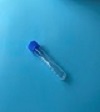Thrombospondin Type-1 Domain-Containing 7A Antibodies, Serum
Thrombospondin Type-1 Domain-Containing 7A Antibodies, Serum-994
THSD7A
THSD7A Ab, S
Thrombospondin
Distinguishing primary from secondary membranous nephropathy cases with antibodies against THSD7A
Immediately following collection, mix sample by gently inverting 5 times
- Allow sample to clot for a minimum of 30 minutes
- Spin
Immediately following collection, mix sample by gently inverting 5 times
- Allow sample to clot
- Spin
- Transfer the serum to a Screw cap transfer vial/tube (Mayo T914), labelled as serum
- Refrigerate
Refrigerated (preferred) - 14 days
Ambient - 8 hours
Frozen - 14 days
Gross hemolysis
Indirect Immunofluorescence Assay (IFA)
Negative
Recently, autoantibodies against phospholipase A2 receptor (PLA2R) in the kidney were determined to be the major target antigen for patients with idiopathic/primary membranous nephropathy (MN). Approximately 70% of patients with primary MN circulate anti-PLA2R antibodies, and in the remaining 30% (who are PLA2R-negative), anti-thrombospondin type-1 domain-containing 7A (THSD7A) was shown to have approximately a 10% prevalence (or about 3% of all primary MN patients). Mouse podocytes express THSD7A and introduction of anti-THSD7A autoantibodies induces MN in murine models. Mouse podocytes do not express PLA2R so exogenous administration of anti-PLA2R does not recapitulate membranous nephropathy in mice. Additionally, THSD7A has been described as a potential tumor antigen and, thus, it has been suggested that THSD7A-positive patients merit a thorough cancer screening.
Absence of circulating autoantibodies does not rule out a diagnosis of primary MN.


